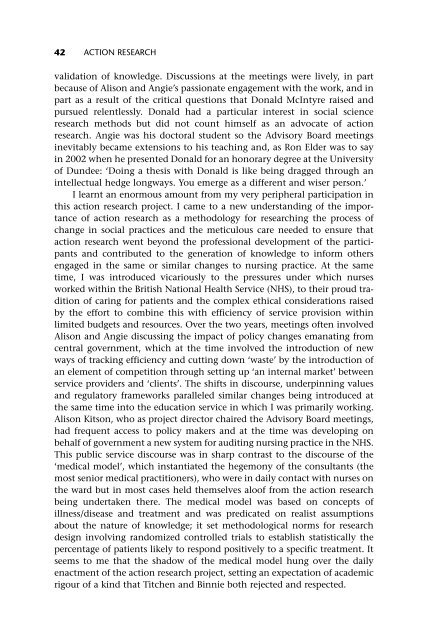Action Research A Methodology for Change and Development
Action Research A Methodology for Change and Development
Action Research A Methodology for Change and Development
You also want an ePaper? Increase the reach of your titles
YUMPU automatically turns print PDFs into web optimized ePapers that Google loves.
42 ACTION RESEARCH<br />
validation of knowledge. Discussions at the meetings were lively, in part<br />
because of Alison <strong>and</strong> Angie’s passionate engagement with the work, <strong>and</strong> in<br />
part as a result of the critical questions that Donald McIntyre raised <strong>and</strong><br />
pursued relentlessly. Donald had a particular interest in social science<br />
research methods but did not count himself as an advocate of action<br />
research. Angie was his doctoral student so the Advisory Board meetings<br />
inevitably became extensions to his teaching <strong>and</strong>, as Ron Elder was to say<br />
in 2002 when he presented Donald <strong>for</strong> an honorary degree at the University<br />
of Dundee: ‘Doing a thesis with Donald is like being dragged through an<br />
intellectual hedge longways. You emerge as a different <strong>and</strong> wiser person.’<br />
I learnt an enormous amount from my very peripheral participation in<br />
this action research project. I came to a new underst<strong>and</strong>ing of the importance<br />
of action research as a methodology <strong>for</strong> researching the process of<br />
change in social practices <strong>and</strong> the meticulous care needed to ensure that<br />
action research went beyond the professional development of the participants<br />
<strong>and</strong> contributed to the generation of knowledge to in<strong>for</strong>m others<br />
engaged in the same or similar changes to nursing practice. At the same<br />
time, I was introduced vicariously to the pressures under which nurses<br />
worked within the British National Health Service (NHS), to their proud tradition<br />
of caring <strong>for</strong> patients <strong>and</strong> the complex ethical considerations raised<br />
by the ef<strong>for</strong>t to combine this with efficiency of service provision within<br />
limited budgets <strong>and</strong> resources. Over the two years, meetings often involved<br />
Alison <strong>and</strong> Angie discussing the impact of policy changes emanating from<br />
central government, which at the time involved the introduction of new<br />
ways of tracking efficiency <strong>and</strong> cutting down ‘waste’ by the introduction of<br />
an element of competition through setting up ‘an internal market’ between<br />
service providers <strong>and</strong> ‘clients’. The shifts in discourse, underpinning values<br />
<strong>and</strong> regulatory frameworks paralleled similar changes being introduced at<br />
the same time into the education service in which I was primarily working.<br />
Alison Kitson, who as project director chaired the Advisory Board meetings,<br />
had frequent access to policy makers <strong>and</strong> at the time was developing on<br />
behalf of government a new system <strong>for</strong> auditing nursing practice in the NHS.<br />
This public service discourse was in sharp contrast to the discourse of the<br />
‘medical model’, which instantiated the hegemony of the consultants (the<br />
most senior medical practitioners), who were in daily contact with nurses on<br />
the ward but in most cases held themselves aloof from the action research<br />
being undertaken there. The medical model was based on concepts of<br />
illness/disease <strong>and</strong> treatment <strong>and</strong> was predicated on realist assumptions<br />
about the nature of knowledge; it set methodological norms <strong>for</strong> research<br />
design involving r<strong>and</strong>omized controlled trials to establish statistically the<br />
percentage of patients likely to respond positively to a specific treatment. It<br />
seems to me that the shadow of the medical model hung over the daily<br />
enactment of the action research project, setting an expectation of academic<br />
rigour of a kind that Titchen <strong>and</strong> Binnie both rejected <strong>and</strong> respected.

















